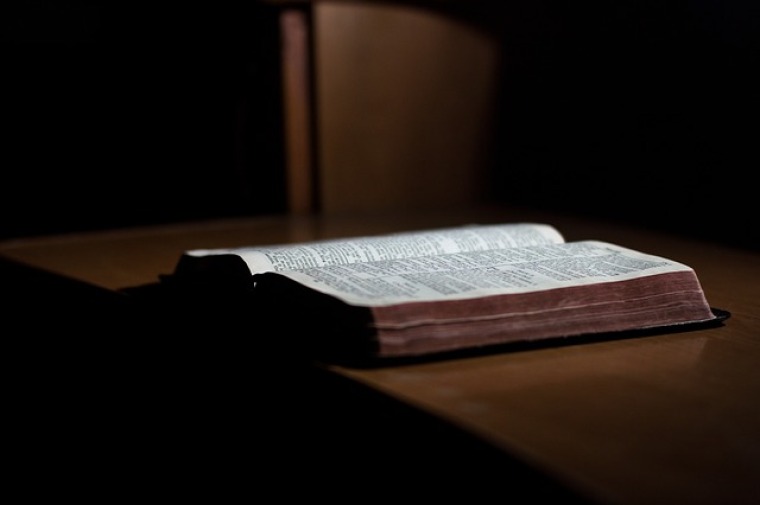Navy launches investigation following complaint over Bible at POW/MIA display

The U.S. Navy has launched an investigation after a secularist group complained about the presence of a Bible at a display about POW/MIA at the U.S. Naval Hospital Okinawa in Japan.
According to Religion News Service, the complaint was filed by the Military Religious Freedom Foundation (MRFF) on behalf of 26 military families in Okinawa. The group contended that the display is a violation of the First Amendment of the U.S. Constitution.
"The issue here is that by including a Bible as part of the POW/MIA Display in the public Galley, it signifies two things. First, that this is an official, command-endorsed Display. Second, that the command is endorsing Christianity (versus other major religions or non-religious beliefs) as expressed in the Christian Bible to the total exclusion of any other belief systems or non-belief traditions," the complaint stated, according to Religion News Service.
Navy Live noted that the POW/MIA table, also known as the "Missing Man" table, is a tradition that has been observed since the end of the Vietnam War in honor of prisoners of war and missing soldiers. Special items, including a Bible, are usually placed at the table to represent traits and virtues of unknown missing soldiers. The Bible is supposed to represent faith in God and the pledge to the U.S.
MRFF President Mikey Weinstein argued that the placard explaining the Bible's presence amounts to evangelization.
"The Bible represents the strength gained through faith to sustain those lost from our country, founded one nation under God," the placard stated, as reported by Religion News Service.
Weinstein said that MRFF lawyers are still looking into the placard's wording to see if it is in violation of the "Status of Forces Agreement, or the treaty we have with Japan."
Mark Stephensen, vice chairman of the National League of POW/MIA Families, contended that the presence of the Bible at the POW/MIA table does not signify bias.
"The Bible was always intended to be there. The POWs held in Hanoi vehemently turned to God for comfort and safety and persistence," he said, according to Religion News Service.
Stephensen's father, U.S. Air Force Col. Mark Stephensen, was reportedly returned to the U.S. 21 years after his plane went down in Vietnam. He argued that those who are outraged by the display are making a conscious effort to be offended.
Weinstein said that a majority of people who complained about the Bible identify as Christians, while others were Jews, Native American, Shintoists, Buddhists and agnostics.
He noted that the American Legion does not require a Bible to be included in POW/MIA tables, but its inclusion is recommended by some legion posts.
 Christians don't have to affirm transgenderism, but they can’t express that view at work: tribunal
Christians don't have to affirm transgenderism, but they can’t express that view at work: tribunal Archaeology discovery: Medieval Christian prayer beads found on Holy Island
Archaeology discovery: Medieval Christian prayer beads found on Holy Island Presbyterian Church in America votes to leave National Association of Evangelicals
Presbyterian Church in America votes to leave National Association of Evangelicals Over 50 killed in 'vile and satanic' attack at Nigerian church on Pentecost Sunday
Over 50 killed in 'vile and satanic' attack at Nigerian church on Pentecost Sunday Ukrainian Orthodox Church severs ties with Moscow over Patriarch Kirill's support for Putin's war
Ukrainian Orthodox Church severs ties with Moscow over Patriarch Kirill's support for Putin's war Islamic State kills 20 Nigerian Christians as revenge for US airstrike
Islamic State kills 20 Nigerian Christians as revenge for US airstrike Man who served 33 years in prison for murder leads inmates to Christ
Man who served 33 years in prison for murder leads inmates to Christ


 Nigerian student beaten to death, body burned over ‘blasphemous’ WhatsApp message
Nigerian student beaten to death, body burned over ‘blasphemous’ WhatsApp message 'A new low': World reacts after Hong Kong arrests 90-year-old Cardinal Joseph Zen
'A new low': World reacts after Hong Kong arrests 90-year-old Cardinal Joseph Zen Iran sentences Christian man to 10 years in prison for hosting house church worship gathering
Iran sentences Christian man to 10 years in prison for hosting house church worship gathering French Guyana: Pastor shot dead, church set on fire after meeting delegation of Evangelicals
French Guyana: Pastor shot dead, church set on fire after meeting delegation of Evangelicals ‘Talking Jesus’ report finds only 6% of UK adults identify as practicing Christians
‘Talking Jesus’ report finds only 6% of UK adults identify as practicing Christians Mission Eurasia ministry center blown up in Ukraine, hundreds of Bibles destroyed: 'God will provide'
Mission Eurasia ministry center blown up in Ukraine, hundreds of Bibles destroyed: 'God will provide' Church holds service for first time after ISIS desecrated it 8 years ago
Church holds service for first time after ISIS desecrated it 8 years ago Burger King apologizes for 'offensive campaign' using Jesus' words at the Last Supper
Burger King apologizes for 'offensive campaign' using Jesus' words at the Last Supper Uganda: Muslims abduct teacher, burn him inside mosque for praying in Christ’s name
Uganda: Muslims abduct teacher, burn him inside mosque for praying in Christ’s name